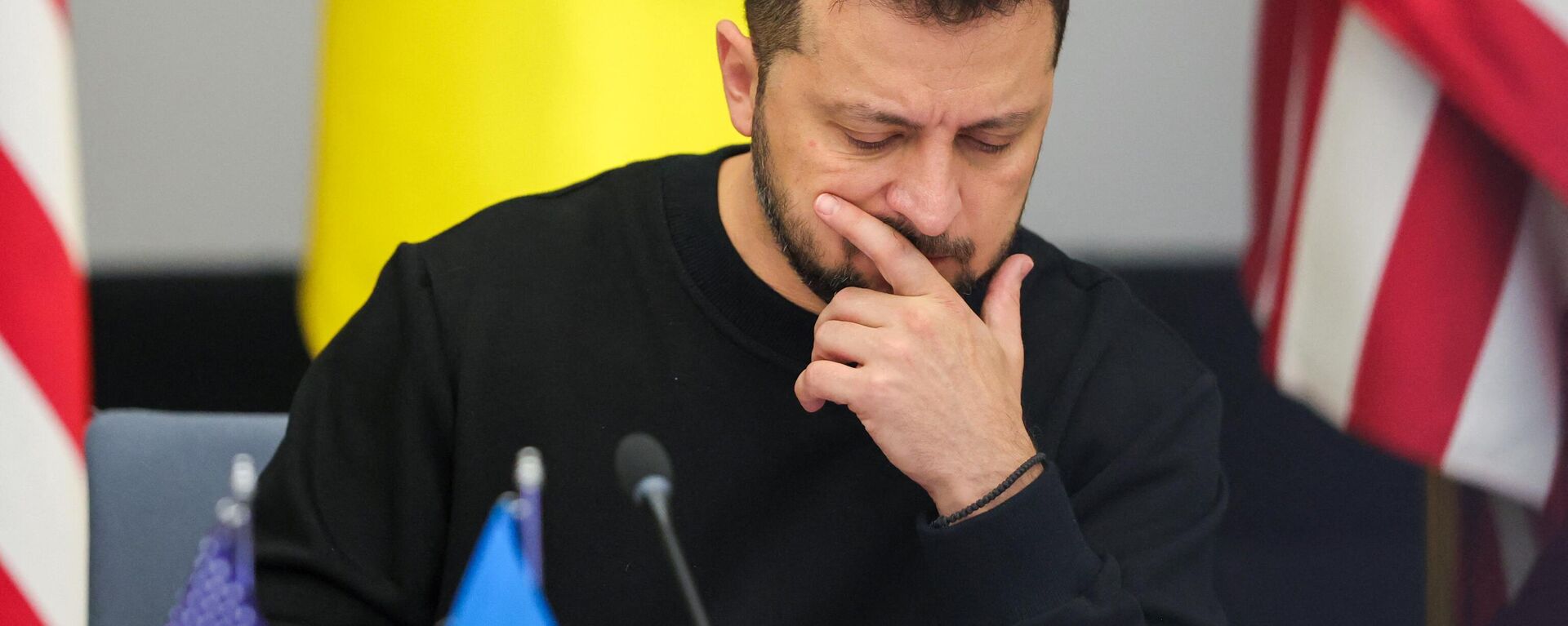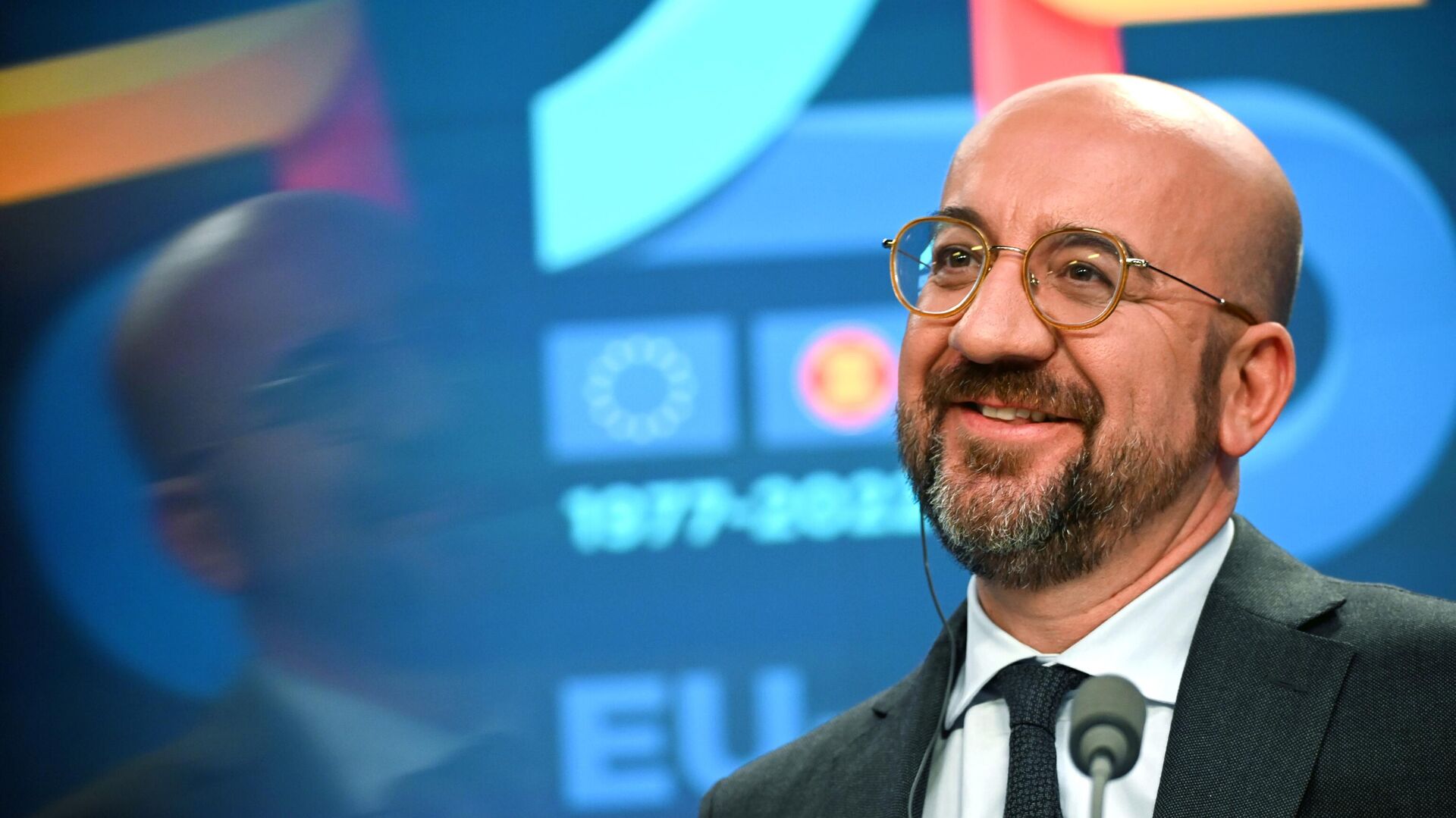https://sputnikglobe.com/20231129/ukrainian-eu-membership-tale-of-high-hopes-and-hard-realities-1115282643.html
Ukrainian EU Membership: Tale of High Hopes and Hard Realities
Ukrainian EU Membership: Tale of High Hopes and Hard Realities
Sputnik International
In a display of rhetorical gymnastics, European Council's president has walked the delicate tightrope of promises and practicalities. Amidst talks of delayed munitions deliveries and EU enlargement conundrums, it appears the bloc's support for Ukraine appears as tangible as a mirage in the desert.
2023-11-29T17:06+0000
2023-11-29T17:06+0000
2023-11-29T17:06+0000
world
europe
charles michel
emmanuel macron
ursula von der leyen
ireland
european council
european commission
european union (eu)
ukraine
https://cdn1.img.sputnikglobe.com/img/07e7/01/12/1106465438_0:159:3079:1890_1920x0_80_0_0_9863bd8d907c2db5d5c8e0320703786c.jpg
President of the European Council Charles Michel has reaffirmed the superficial resolve of EU leaders to render support for Ukraine’s disappointing military push, even as the country faces an imminent failure after its botched counteroffensive.Speaking to the press on Wednesday, Charles Michel highlighted that the upcoming EU-Balkans summit in Brussels in mid-December will focus on bolstering aid for Ukraine. Leaders of the 27-member bloc are expected to discuss and decide on financial, military, and political measures, which may also involve starting discussions on Ukraine's EU membership.However, apprehensions regarding the practicality and possibility of enlargement within member countries pose a bump to the venture championed by French President Emmanuel Macron and fellow leaders, including European Commission President Ursula von der Leyen. Ireland’s Foreign Affairs Minister Peter Burke, meanwhile, emphasized caution. “Candidate countries must, on a merit-based approach, measure and comply with all the criteria before negotiations are opened,” he told news sources.Critics contend that the European Union's aid for the Kiev regime lacks support, while the EU's actions are more reactionary to current events due to fear of the bloc’s disintegration. “The level of enthusiasm for EU enlargement and reform is, in reality, quite low…Scholz and Macron don’t really want to reform or enlarge — but they realize that unless they do something, the EU could come apart,” Alberto Alemanno, professor of EU law at HEC business school in France, told a media outlet.Observers note that Michel's recognition of Ukraine's military "resilience" largely ignores the conflict's significant human, economic, demographic, and infrastructural costs.The European Council president stated, “We will keep our promise” of delivering one million shells to the Ukrainian Armed Forces by March next year. However, he admitted, "it will take a little longer than we would have liked. Several additional months will undoubtedly be necessary.” He added, “everything must be done to achieve the objective” in 2024.The explicit indication of the delayed delivery timeline reflects gross inefficiencies in the bloc’s production capacity and logistics, questioning its ability to provide extensive military support. The president of the European Council suggested that the production difficulties stem from European nations' reliance on so-called peace dividends, which resulted in underinvestment and less support for the creation of a European armed forces.Charles Michel's statements encompass a range of issues, highlighting a gap between the EU's intentions and actions, as well as disunity among member states. It emphasizes the 27-member alliance's support for Ukraine as more symbolic than substantial and points out obvious inadequacies in military aid delivery.
https://sputnikglobe.com/20231128/the-west-has-lost-confidence-political-dysfunction-in-ukraine-may-cost-zelensky-his-job---analyst-1115244616.html
ireland
ukraine
brussels
Sputnik International
feedback@sputniknews.com
+74956456601
MIA „Rossiya Segodnya“
2023
Chimauchem Nwosu
https://cdn1.img.sputnikglobe.com/img/07e7/09/01/1113046371_0:99:1536:1635_100x100_80_0_0_9c5c627283eca931c39fe4852bbb301c.jpg
Chimauchem Nwosu
https://cdn1.img.sputnikglobe.com/img/07e7/09/01/1113046371_0:99:1536:1635_100x100_80_0_0_9c5c627283eca931c39fe4852bbb301c.jpg
News
en_EN
Sputnik International
feedback@sputniknews.com
+74956456601
MIA „Rossiya Segodnya“
Sputnik International
feedback@sputniknews.com
+74956456601
MIA „Rossiya Segodnya“
Chimauchem Nwosu
https://cdn1.img.sputnikglobe.com/img/07e7/09/01/1113046371_0:99:1536:1635_100x100_80_0_0_9c5c627283eca931c39fe4852bbb301c.jpg
european council, charles michel, ukraine military aid, eu leaders, eu-balkans summit, brussels, ukraine financial aid, military support, political measures, eu membership, eu enlargement, ursula von der leyen, kiev regime, munitions delivery, european armed forces.
european council, charles michel, ukraine military aid, eu leaders, eu-balkans summit, brussels, ukraine financial aid, military support, political measures, eu membership, eu enlargement, ursula von der leyen, kiev regime, munitions delivery, european armed forces.
Ukrainian EU Membership: Tale of High Hopes and Hard Realities
In a display of rhetorical gymnastics, European Council's president has walked the delicate tightrope of promises and practicalities. Amidst talks of delayed munitions deliveries and EU enlargement conundrums, it appears the bloc's support for Ukraine appears as tangible as a mirage in the desert.
President of the
European Council Charles Michel has reaffirmed the superficial resolve of EU leaders to render support for Ukraine’s disappointing military push, even as the country faces an
imminent failure after its
botched counteroffensive.
Speaking to the press on Wednesday, Charles Michel highlighted that the upcoming
EU-Balkans summit in Brussels in mid-December will focus on bolstering
aid for Ukraine. Leaders of the 27-member bloc are expected to discuss and decide on financial, military, and political measures, which may also involve starting discussions on Ukraine's EU membership.
However,
apprehensions regarding the practicality and possibility of enlargement within member countries pose a bump to the venture championed by French President Emmanuel Macron and fellow leaders, including European Commission President Ursula von der Leyen. Ireland’s Foreign Affairs Minister Peter Burke, meanwhile, emphasized caution.
“Candidate countries must, on a merit-based approach, measure and comply with all the criteria before negotiations are opened,” he told news sources.
Critics contend that the European Union's aid for the Kiev regime lacks support, while the EU's actions are more reactionary to current events due to fear of the bloc’s disintegration. “The level of enthusiasm for EU enlargement and reform is, in reality, quite low…Scholz and Macron don’t really want to reform or enlarge — but they realize that unless they do something, the EU could come apart,” Alberto Alemanno, professor of EU law at HEC business school in France, told a media outlet.
Observers note that Michel's recognition of
Ukraine's military "resilience" largely ignores the conflict's significant human, economic, demographic, and infrastructural costs.
The European Council president stated, “We will keep our promise” of delivering one million shells to the Ukrainian Armed Forces by March next year. However, he admitted, "it will take a little longer than we would have liked. Several additional months will undoubtedly be necessary.” He added, “everything must be done to achieve the objective” in 2024.

28 November 2023, 03:56 GMT
The explicit indication of the delayed delivery timeline reflects gross inefficiencies in the bloc’s production capacity and logistics, questioning its ability to provide extensive military support. The president of the European Council suggested that the production difficulties stem from European nations' reliance on so-called peace dividends, which resulted in underinvestment and less support for the creation of a European armed forces.
Charles Michel's statements encompass a range of issues, highlighting a gap between the EU's intentions and actions, as well as disunity among member states. It emphasizes the 27-member alliance's support for Ukraine as more symbolic than substantial and points out obvious inadequacies in military aid delivery.




